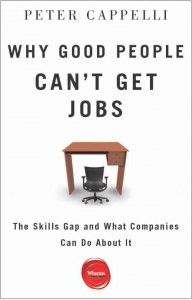 Also posted on the TalentCircles blog.
Also posted on the TalentCircles blog.
A refreshing short book by Peter Cappelli, Director of Wharton’s Center for Human Resources! This is a must read for any HR Professional, of course, but even more for anyone who is in a management position and has the power, or simply the will, to put an end the current “crippling employer-employee standoff.” The purpose of Peter Cappelli’s book is to get “America’s job engine revved up again.”
We are all familiar with the litany of complaints: Companies can’t find skilled workers, schools are not providing the right kind of training, the government doesn’t let in enough highly skilled immigrants, prospective employees don’t want jobs at the wages that are offered, etc. If perception and scattered research might give some weight to such complaints, Cappelli demonstrates that they don’t add up when looked at holistically, and that they come across as urban myths.
Are we a nation of un-qualified people? In a market with a lot of job applicants, companies tend to look for purple squirrels or unicorns. Are job seekers unqualified for not fitting a paranormal job description? Does it allow us to jump to the conclusion that “there is a skills gap” when the hardest-to-fill jobs appear to be those that often require the least skills? In reality, lots of job seekers are overqualified: “When applicants far outnumber job openings, the overqualified bump out those only adequately qualified… And the proportion of overqualified has more than doubled over the past generation.” Cappelli sees very little evidence of an actual supply problem and asks a valid question: Isn’t it a paradox that the US would rank seven among 39 countries (survey performed by Manpower in 2011) in terms of employers’ complaints about an inability to fill jobs, while in China, the new global rising power, these complaints are half as frequent? Does China have a larger pull of “qualified” people? No — simply millions learn on the job and do so very quickly, just as generations of Americans have. In the end, the analysis shows that skills aren’t the issue, but market-determined wages are…
Are your kids less intelligent that you were at their age? Nobody wants to believe this, but businesses are quick to assume that today’s workforce is more flawed than 20 years ago. There is no evidence to support this “good old days bias” either. Cappelli indicates that US student performance has actually improved over the past decades. In addition, studies by the Organisation for Economic Cooperation (OCDE) do not show any absolute decline in US scores. Emerging countries are simply catching up — and they do not belittle their workforce nearly as much as we do. Another great point: the history of Russia “reminds us that an economy’s success is not related to education in any simple fashion.”
So what’s wrong? Job seekers and employers talk at cross purposes. Is it reasonable to expect job seekers to have done the work before because companies don’t want to train people? While it’s certainly valid to fear that a newly trained employee might go to the competition, it’s equally logical to wonder why a newly trained employee would leave… Maybe this was not the right hire in the first place… Maybe the very culture or a non-existent culture of the company is the problem. Is it reasonable to assume that filling a job vacancy is akin to replacing a part in a washing machine — what Peter Cappelli calls the “Home Depot Syndrome” — and assume that people are mere cogs in the industrial machine? This may not be the safest angle to increase a company’s productivity or creativity, or to even motivate people to join a company.
Cappelli mentions two major problems: The first one is the automated software used to filter job seekers — it allegedly complies with the mandate of equal treatment of all candidates, yet ends up generating pervasive unfairness: people can’t find jobs even though there are millions of open positions. How long will the legal requirements be an excuse for using antiquated software? The second one is the loss of power of the HR function: “Not coincidentally, the United States has the weakest human resources in the industrialized world.” The ultimate call is certainly to re-empower human resources, and re-empower recruiters —give them a strategic role. Brain drain is the death of companies, and so is brain blindness: “Millions of unfilled jobs are costing the economy billions of dollars in lost business,” reminds Cappelli.
This little book is a powerful eye-opener. As I was reading through it, it seemed to me that what is initially presented as a sort of standoff between job seekers and employers may not be that willingly created by employers, and may raise a broader question about the ability for established companies to realize that economic survival in a global economy is more about building and nurturing talent and less about “filling” positions. The vast majority of the people who look for the perfect match today would not be hired in their own company. They benefited from a system when trust in people and intra-entrepreneurship mattered, which is the deep history of this country: the US started the modern industrial revolution thanks to millions of “unqualified” people — and Cornelius Vanderbilt left school when he was 11.

1 response so far ↓
1 Jason Thompson // Nov 21, 2012 at 9:02 am
I completely agree that the skilled worker complaint is an urban myth in this country. The truth is there are very qualified people who are willing to work, but not necessarily at the wages that some outsourced employees are willing to work at. I see this all the time in the tech industry, where our jobs are be outsourced overseas to individuals who are overqualified but willing to work for scraps.
Leave a Comment